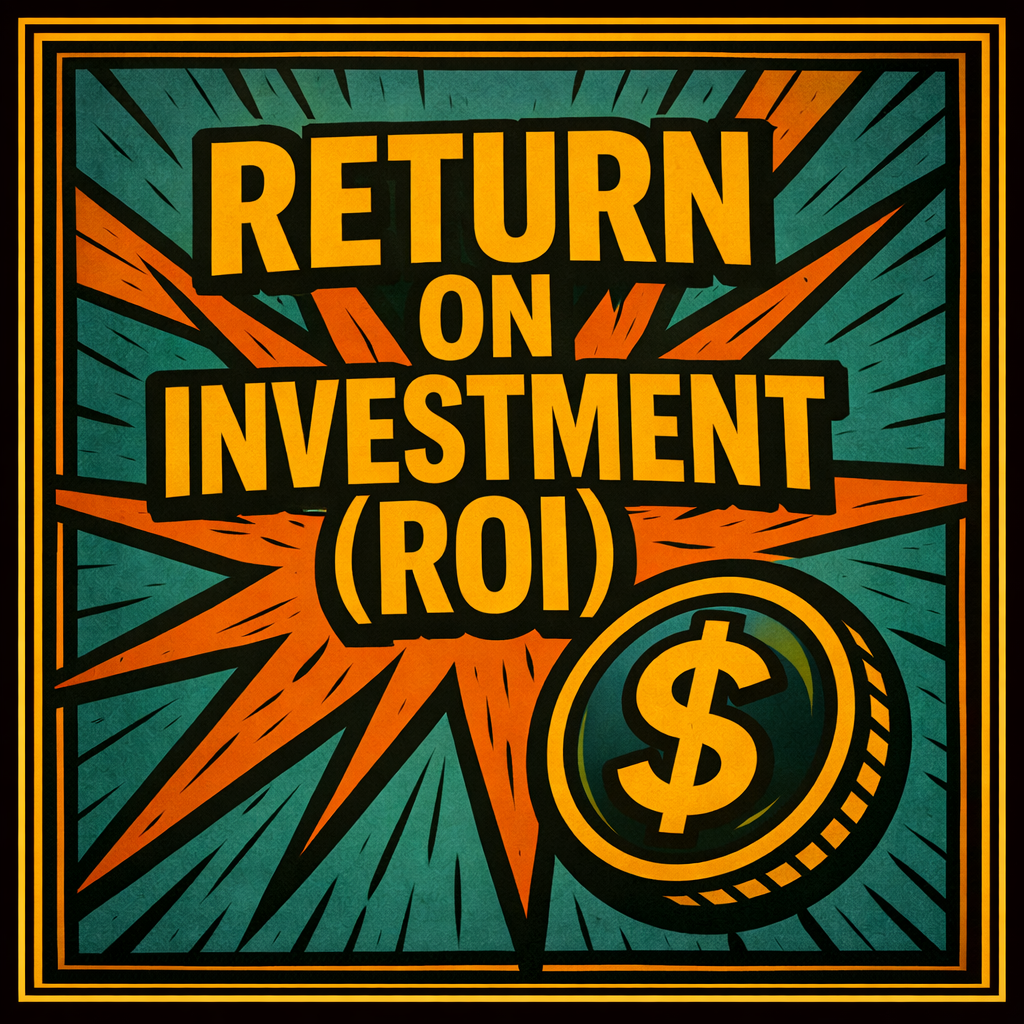Return on Investment (ROI)
“Every Dollar’s Gotta Hustle”

ROI (Return on Investment) tells you how much profit or value you gain from an investment — relative to what it cost you. It’s the go-to metric for answering the question: “Was it worth it?”
From marketing campaigns to equipment purchases, hiring decisions to software tools — ROI helps you quantify results and prioritize smarter investments.
The Basic Formula
ROI = (Gain from Investment – Cost of Investment ÷ Cost of Investment)×100
In Plain Terms:
If you spent $10,000 and made $15,000 back, your ROI is: 50%
ROI Application
- Decision-Making Tool: Helps compare options and prioritize high-return activities
- Accountability Check: Tracks whether your spend is generating real value
- Growth Filter: Keeps scaling efforts focused on results, not just activity
- Universal Language: Lenders, investors, and execs all speak ROI
⚙️ Common Business Use Cases
| Investment Type | What You’re Measuring |
|---|---|
| Marketing Campaign | New leads, revenue, or customers vs. spend |
| New Equipment | Output gains or cost savings vs. purchase price |
| Hiring a New Role | Revenue or productivity increase vs. salary & cost |
| Tech/Software Tools | Time saved, error reduction, output lift |
| Training & Development | Performance gains vs. training expense |
What Good ROI Looks Like
There’s no one-size-fits-all benchmark, but:
Over 100% = Strong payoff
30%–100% = Solid and usually acceptable
Below 30% = Proceed with caution unless strategic
Negative ROI = You lost money — reassess or stop
Caveats to Watch For
Hidden Costs: ROI can be skewed if you forget overhead, labor, or time
Short-Term Bias: ROI doesn’t always reflect long-term strategic value
One-Dimensional: High ROI doesn’t mean it’s scalable or sustainable
📊 ROI Comparison Table
| Investment Type | Example Spend | Example Return | ROI | Notes |
|---|---|---|---|---|
| Digital Ad Campaign | $8,000 | $12,000 | 50% | Good — scalable, testable |
| New Sales Rep | $90,000 | $160,000 | 78% | High payoff, but slower ramp-up |
| CRM Software Upgrade | $15,000 | $25,000 saved/time/value | 67% | Operational ROI |
| Product R&D Investment | $50,000 | $0 in year 1 → $200K in year 2 | Long-term ROI | Consider lifetime value |
| Office Renovation | $100,000 | Soft returns (morale, brand) | N/A | Hard to quantify — track indirect gains |
ROI Example: Marketing Campaign
Scenario:
You run a 3-month digital ad campaign to generate new leads.
Investment Costs:
Cost Component Amount
Ad Spend $10,000
Graphic Design $1,500
Marketing Consultant $2,000
Landing Page Setup $500
Total Investment $14,000
Return (Gain):
Revenue from campaign = $24,000
✅ Result: 71.4% ROI — You earned $1.71 back for every $1 spent.
ROI Example #2: Equipment Purchase
Scenario:
You buy a new piece of packaging equipment that automates part of your process.
Investment Costs:
Cost Component Amount
Equipment Purchase Price $30,000
Delivery & Installation $2,000
Training Staff $1,000
Total Investment $33,000
Return (Gain):
- Labor cost savings over 12 months: $18,000
- Increased output value: $12,000
- Reduced error/waste savings: $5,000
- Total Return: $35,000
✅ Result: 6.06% ROI — A modest return, but with potential compounding over 2–3 years.

Final Thought
ROI is your lens for clarity — helping you say yes to what pays off and no to what drags you down.

